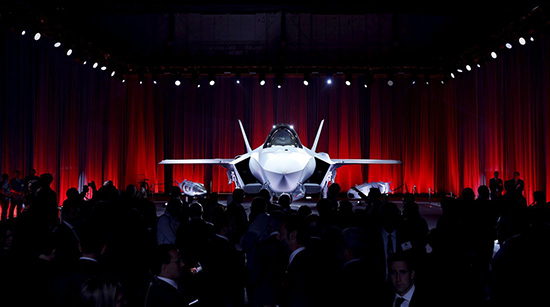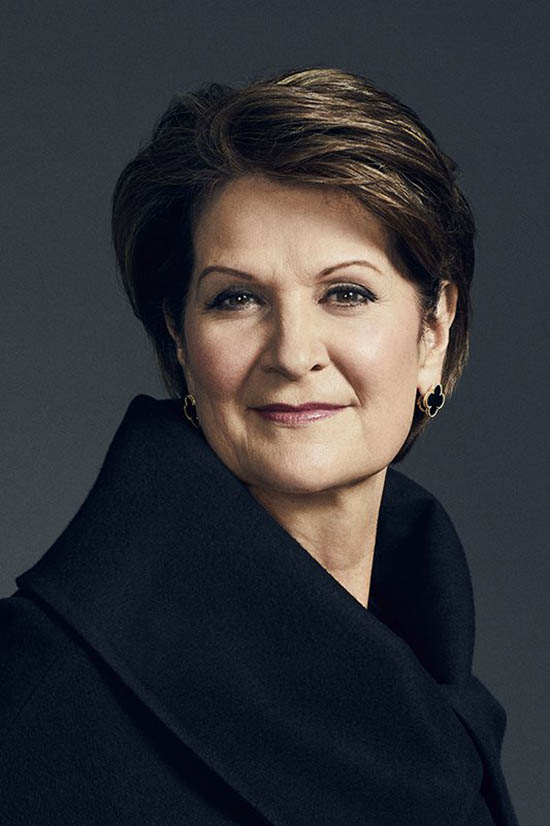这三位女性正缔造着美国的军事力量
|
“最后一个男人。”华尔街最近给美国五大军火商之一雷神公司的董事长兼首席执行官汤姆·肯尼迪起了这个绰号。毕竟,在五家美国军火巨无霸的领导者中,他已是唯一一位没有入选《财富》最具影响力的商界女性排行榜的高管。对此肯尼迪表示:“我为本行业感到无比自豪。” 今年7月,另一军火巨头诺斯洛普格拉曼公司宣布,首席执行官韦斯·布什将在今年年末卸任,现任首席运营官的凯西·沃登将接任,成为这家公司历史史上的首位女性首席执行官。和其他三位女性——洛克希德·马丁的首席执行官玛丽莲·休森、通用动力的首席执行官菲比·诺瓦科维奇、波音公司旗下的防务、航天与安全业务的总裁兼首席执行官利安妮·卡雷特一样,沃登也将由此跻身美国国防承包商的精英俱乐部。去年,这四位女性高管领导的公司合计斩获高达1100亿美元的国防相关收入。 沃登的擢升在企业界引起了轰动。国防与航天领域曾经是男性高管的天下,而在管理层多元化的宣传攻势下,短短几年工夫,女性就势如破竹,突破了职场天花板,无论是晋升速度之快还是职位之高,该行业女性高管的表现都远超大多数《财富》美国500强公司里的同行。最近刚同意被竞争对手SAIC收购的军用信息技术和网络安全公司Engility也有一位女性首席执行官——林恩·杜格勒。她认为:“没有必要强调男性和女性,实际上是有能者居之。” 据美国民调与智库机构皮尤研究中心统计,在标普1500成分股公司中,女性首席执行官仅占5%,而国防与航天行业的女性首席执行官却在该行业顶层高管中占将近19%。若论起同政府和军方的合作关系,没有哪个领域的企业比国防的更密切,这可能是该行业更接近实现性别平等的一个原因。企业高管猎头公司Heidrick & Struggles的航天、国防与航空领域负责人帕特里克·格雷指出,美国军方在刻意扩大女性的影响力,从上世纪90年代开始,美国陆海空三军出现了一批女将军,“国防业已经认识到,应该跟随客户的变化趋势。”麦肯锡高级合伙人拉雷娜·伊认为:“越来越多女性跻身公司最高层,甚至首席执行官,这并非偶然。” |
“THE LAST MAN STANDING.” That’s what some on Wall Street have recently nicknamed Tom Kennedy, the chairman and CEO of Raytheon. After all, he’s the only leader of a top five U.S. defense business who isn’t on Fortune’s Most Powerful Women list—and for that fact, says Kennedy, “I couldn’t be prouder of our industry.” This July, Northrop Grumman announced that CEO Wes Bush would step down at the end of the year and be replaced by the first woman to hold that office, current COO Kathy Warden. She will join an elite club of defense contractor CEOs that includes Lockheed Martin’s Marillyn Hewson, General Dynamics’ Phebe Novakovic, and Leanne Caret, who heads Boeing’s defense, space, and security division. Together, their companies generated a staggering $110 billion in defense-related revenue last year. Warden’s promotion made waves across the corporate world, where diversity advocates marveled at the way the once male-dominated defense and aerospace industry had, in a few short years, blown up its own glass ceiling, elevating women higher and faster than most of the Fortune 500. “It isn’t a male-female thing, necessarily, but really just acknowledging that talent won,” says Lynn Dugle, CEO of military IT and cybersecurity firm Engility, which recently agreed to be acquired by rival contractor SAIC. In the S&P 1500, women account for nearly 19% of the CEOs in aerospace and defense, accord-ing to the Pew Research Center, compared with just 5% across all companies. No sector works more closely with the government and military than defense, which may be one reason it’s closer to gender equality. With the armed forces making deliberate efforts to expand women’s roles and the emergence of a generation of female generals as well as Air Force and Navy secretaries beginning in the ’90s, “the defense industry has realized they need to mirror their customers,” says Patrick Gray, the aerospace, defense, and aviation practice leader at executive search firm Heidrick & Struggles. A decade ago, the companies redoubled their efforts. “It’s not an accident … that they’ve become C-suite or a CEO,” says Lareina Yee, a senior partner at McKinsey. |

|
对于国防业的领导层转变,体会最深的莫过于琳达·赫德森。2009年,她就任BAE系统公司的首席执行官,成为业内首名任这一职位的女性。她的职业生涯始于1972年,当时周围都是男同事。赫德森回忆道:“我需要他们忘记我是女人。”她说等到职业后期,“身为女性某种程度上成了一种优势,女性已经可以冲破重重困境。” 在战场上,美国稳操胜券,国防行业的女性也打算保持佳绩。尽管要争抢政府的国防预算蛋糕,但高管们都表示各家公司肩负着同样的保家卫国责任。正如卡雷特所说:“目标就是确保战争不公平,优势要在我们这边。” 然而,现在要保持美国的军事实力和技术水平都处于领先地位绝非易事。美国与中俄两个超级大国的关系愈发紧张,中俄的技术水平提高速度越来越让美国担心。在国际上,被美国称为流氓国家的朝鲜和伊朗已拥有核武器,一些极端主义集团的信徒还在继续暴行。即使在地球大气层之外,也有不容小觑的实体和网络攻击威胁。另外,某些国家的领导人有可能抛弃反化学武器和种族灭绝的相关国际法。“年复一年,形势越加严峻。”休森在谈到地缘政治风险时说道。 种种担笼罩美国政界。共和党人领导的美国国会已经将2018财年的国防部预算上调约15%,增至7000亿美元,民主党对此表示支持。而暴脾气的最高领导人——美国总统特朗普更是明确支持国防。他曾直接宣布对国家安全领域的期待,在推特上发帖称要降低洛克希德·马丁的F-35生产成本,还表示要用“智能”导弹向叙利亚开火。国防企业的高管们认为,从外部环境来看当前是从业以来行业环境最佳的时期。“造就这场完美风暴的是,我们对国防领域的发展前景达成了共识。”杜格勒如是说。 如此背景下,女性首席执行官也拥有大展才华的机会。以休森为例。自她2013年执掌洛克希德·马丁以来,公司的股票回报率达到338%。总体而言,特朗普当选以来,航天和国防类股一路高涨,涨幅较大盘高出29个百分点。三场采访中,休森、卡雷特和杜格勒都探讨了在高风险环境下如何领导企业。(沃登和诺瓦科维奇拒绝接受采访。)以下是她们的看法,因篇幅有限也为表述清晰,内容略经编辑。 |
No one felt the shift more viscerally than Linda Hudson, who in 2009 became CEO of BAE Sys-tems and the industry’s first female leader. When she launched her career surrounded by male colleagues, in 1972, “I needed them to forget I was female,” she recalls. By the end of her career, she says, “being female had somewhat turned into an advantage—that you had risen against all odds.” On the battlefield, the U.S. has the odds on its side—and these women plan to keep it that way. Even as they compete for government budget dollars, the executives say they share a duty to the United States: “To ensure that there is an unfair fight—unfair in our favor,” as Caret puts it. Yet maintaining this country’s lead in military might and technology has never been more difficult. There is rising unease in U.S. relations with superpowers Russia and China, whose technical prowess is increasing at a breakneck pace. Add to that the nuclear capabilities of rogue states including North Korea and Iran, and continuing atrocities by acolytes of extremist factions. There are credible threats of attacks (physical and cyber) even beyond Earth’s atmosphere. And heads of state have shown a willingness to disregard international law on chemical warfare and genocide. “Every year it seems to get even more dramatic,” Hewson says of the geopolitical risk climate. Those fears have resounded in Washington, D.C., where a Republican-led Congress granted the Pentagon a budget increase of more than 15%—to $700 billion for fiscal 2018—with vocal sup-port from the other side of the aisle. It hasn’t hurt to have a hot-tempered Commander-in-Chief who has been direct about announcing what he wants on the national security front, whether it’s cost reductions on Lockheed’s F-35 fighter jet or “smart” missiles to fire on Syria (both expressed via tweets). All told, executives describe what may be the best industry climate of their careers. “What makes this the perfect storm is that we really do have consensus around what needs to happen in our defense space,” says Dugle. Against that backdrop, the female CEOs have had a chance to shine. Since Hewson took over Lockheed Martin in 2013, for example, the stock has returned 338%. Overall, since President Trump’s election, aerospace and defense stocks have outperformed the market by 29 percentage points. In separate interviews, Hewson, Caret, and Dugle discussed leadership when the stakes are the highest. (Warden and Novakovic declined to participate.) What follows is in their words, edited for length and clarity. |
|
开路先锋 |
Trailblazing |

|
我和通用动力的菲比·诺瓦科维奇在2013年的同一天担任首席执行官。我们是好朋友,曾聊过作为公司史上首位女性领导者第一天上任的感觉。刚开始我觉得,“不想让人感觉得到这个职位只因为我是女性。”我希望大家认识到,取得这样的成绩是因为公司给我们机会学习、成长,变得强大,在工作中展现我们的能力。通过种种努力,最终我们可以成为公司最高层。 不过,我和菲比也讨论了我们成为模范榜样的问题。这是我们应该认真对待的事,因为能启发和激励其他女性,像在告诉她们:“我也可以做那样的工作。” 我还记得,刚入职场时,我不是很确定自己有没有为谋求事业进步做好准备。没过多久,我开始为洛克希德·马丁效力,公司把我列为一个专门的一般管理层计划人选,让我真正走上了职业进取之路。现在想来真不可思议,那可是三十年前,这家公司就意识到要投入培养人才。对员工个人来说,只需要好好表现、把握这些机会就够了。所以,当董事会让我执掌洛克希德·马丁经营大权时,可以说:“我准备好了。” 看看凯西(沃登)、利安妮(卡雷特)和我们行业的其他女高管,你会发现,关键是她们能得到和男性一样的经验。米歇尔·埃文思是我们刚刚任命的一位女性高管,她将领导公司210亿美元规模的航空业务,以及我们最大的F-35项目。已经在洛克希德·马丁工作多年的她,有着丰富的经验,对业务盈亏负有责任感,得到这一职位不算意外。我认为,不管是男性还是女性,这些都是担任首席执行官需要具备的。 |
Phebe Novakovic at General Dynamics and I started as CEOs on the same day in 2013. Phebe and I are good friends and have talked about what it’s like on day one as the first female leader of our companies. And early on, I kind of felt like, “Well, gee, I don’t want to be recognized that I achieved this just because of my gender.” I just wanted to be recognized that I achieved that through being in a company that gives us opportunities to learn and grow and be strong and demonstrate our capabilities in our performance. And through those results, ultimately we can achieve the most senior position in the company. However, both Phebe and I discuss that we are role models. And that’s something that we should take very seriously because it inspires and motivates other women to say, “I can be in that job.” I can think back at times early in my career when I wasn’t quite sure if I was ready for something. Soon after I started at Lockheed Martin they put me on a special general management development plan, and that is what really got me on a path. And I think back, gosh, over 30 years ago, this company recognized that you invest in talent. It’s up to the individual to perform, to accept those opportunities. So when the board offered me the position of running Lockheed Martin, I said, “I’m ready.” When you look at Kathy [Warden] and Leanne [Caret] and others in our industry, it’s really a matter of them getting the experiences just like a male would get. We just named a woman, Michele Evans, to lead our $21 billion aeronautics business and the largest program that we have, the F-35. But she didn’t get there by accident. She got there because she has developed a long career at Lockheed Martin and gotten a lot of different experiences. She’s had profit and loss responsibility. And all of those things I think are what you look for, whether it’s a man or a woman, to take over as CEO. |

|
实际上,有人曾告诉我,我永远不会做管理层。我的二级主管说,我太爱笑,要么大笑要么微笑。可我的直接上级不同意那位主管的看法,他说:“我们需要让你去担任和现在不同的职位,因为要是不那么做,你就不会成为我预计你能变成的那种人。”这是要明确公司会为所有人创造机会,不单是对男性,对作为少数群体的女性也是如此。 不过,我从来没有期待自己会做到今天这个位子。当时我在和我们的董事长丹尼斯·米伦伯格以及人力资源主管开会,突然之间,丹尼斯说:“嘿,利安妮,你能不能再待久一点,我要和你谈谈。”然后,他们就关上门,我忍不住叫起来:“天啊,你是要炒了我吧。”丹尼斯却这样回应:“什么?我是想让你做这个(工作)。” |
I was actually told I would never make management. My second level supervisor said I laughed too much, I smiled too much. But my immediate boss disagreed with his boss, and he said, “We need to get you to a different position because you’re not going to be who I think you can be if we don’t get you somewhere else.” It’s about making certain that we’re creating opportunities for everyone—for women, for minorities, for men. But I never had any expectation I would be in this office. I was in a meeting with our chairman, Dennis Muilenburg, and the head of our HR, and all of a sudden, Dennis goes, “Hey, Leanne, can you just stay a little bit longer because I need to talk to you.” And they’re shutting the door, and I blurted out, “Oh, my God, you’re firing me.” And Dennis is like, “What? No. I want you to do this [job].” |

|
我是我家里第一个上大学的女性。25年前,甚至15年前我都不敢想未来有一天在洛克希德·马丁、诺斯洛普格拉曼公司和通用动力之类公司会出现女性领导人。个人职业生涯中,我告诉自己很多次“不可能。”我记得后来的老板领我进入雷神公司时问我,愿不愿意当其中一家公司的总裁?我的回答是,“哦,天呐,你应该考虑X、Y和Z。他们更有资格。”后来我告诉一位好友说这件事,她说,“这是我听过最愚蠢的事,以后再别提了。你真是一个坏榜样。”所以我真的很幸运,人们给了我很多超乎预料的好机会。 我很担心国家的敌人,把其中几个大国人口加起来就会发现,美国明显处于劣势。所以对我来说,性别多样性是国家安全问题。如果国家能利用好每个人才,对大家都有益。 对女性来说,去沙特阿拉伯挑战更大,沙特与美国的国防公司达成了数十亿美元的交易。我在沙特就犯过不少新手级错误。新手犯错案例1:门打开就进电梯。错!男性跟女性要乘坐不同的电梯。新手犯错案例2:喝咖啡太多,因为没有女性洗手间。新手犯错案例3:安检时跟着队伍排队。一般都是男性的队伍,旁边才是女性专门的排队区域。 休森:我在沙特住过不短时间。我穿着长袍,脸上围着莎依拉,尊重当地传统,尤其是女性的着装习惯。但除此之外,我并未因女性身份受到特别对待,跟其他国家高级政府官员接待我的方式差不多。 特朗普时代的国防 休森:我经常旅行,跟世界各国领导人会面,经常听说地缘政治充满不确定性和波动性的严重性。地缘政治并不平衡,跨越各大洲,而且威胁正持续加速,很让人担心。老实说,威胁涉及所有领域,空中、陆地、太空,还有网络。与俄罗斯、非政府团体和恐怖分子都有关。因此,继续保持并提升技术优势至关重要。我们的对手或潜在对手都在迅速发展。 杜格勒:两党领导人都意识到,目前战备情况和一些技术面临前所未有的威胁,尤其太空方面。现在可没有数十年时间供我们发展技术,积攒经验和实践,所以在太空和网络方面存在很多未知数。政府提供了超越对手的最好潜在机会,但更可能是巨大的挑战。国会议员积极批准了十年来最大的预算后,现在可能是全行业最激动人心的时刻。 卡雷特:现任政府不管是对话的态度,还是向业界传输观念都很特别。他们非常坦诚,有时话不一定好听,但对达成更进一步合作很重要。 空间战争 卡雷特:很多人都没有意识到空间对当代人生活的重要性。但如果没有太空中的卫星,手机里的GPS功能就会作废。所以看到人们终于开始理解世界多么大之后,我很高兴。 杜格勒:多年来人们一直在争论:太空是战争的一部分吗?其实很荒谬。因为地面战争是由空间驱动的。想想卫星通信,有了定位我们才知道军队在哪里,移动方向以及实现沟通。还有GPS和精准导航,如果想瞄准某处,首先得知道具体位置在哪。因此,如果对手摧毁空间设备,地面部队也会瘫痪。受影响的不仅是军事或战争,银行交易也会使用GPS技术。因此,如果系统受到某种攻击,银行业也会崩溃。 休森:导弹预警等功能背后都是卫星支持。看看9月中旬的佛罗伦萨飓风就能明白。今年,我们根据美国国家海洋和大气管理局的推荐推出了最先进的气象卫星,捕捉的画面简直像从黑白电视一步进化到高清大屏幕电视,甚至能绘制闪电信息。这颗卫星对拯救生命作用很大,因为在气候现象和飓风形成早期即可预测。 保持领先地位 休森:我们正研究的一个重要领域是超音速,可以超过5马赫,即超过声速5倍,包括武器也包括飞机或宇宙飞船之类。美国之外的其他国家也在该领域迅速崛起,保持领先地位很重要,所以我们在投入大量资金,美国国防部也是。如果知道其他人在投资研究高超音速武器,就得确保能实现防御。定向能量或激光武器系统非常重要。这类武器不需要传统的弹药补给,成本更低,而且更有效率。我们还有所谓的碰撞击杀技术,类似用子弹击中子弹。目标是在导弹落地甚至破片之前就能击中并实现驱散。 自动驾驶非常重要。不幸的是,阿富汗和伊拉克的简易爆炸装置对驾驶卡车(提供补给)的人们危害非常大。因此,我们团队找了一架之前用于运送木料上山的直升机,把它改装为自动驾驶系统,后来运送了价值耗资数百万英镑的补给。谁能算出因为无人驾驶挽救了多少人的生命? 卡雷特:有一艘55英尺长的潜水艇在水下待命,不需要驾驶就能实现自动部署。我们深信也希望达到的目标是,自动空中交通会变成日常生活一部分。波音将走在行业前列。在我看来,某天人们肯定会钻进各自的小车舱,然后开始行程。 杜格勒:技术发展的速度可能是好事,也可能是坏事:如果我们是行动最快的,比如在其他国家之前实现量子计算,当然很好。如果进展不顺,就不太妙。 911事件发生并不是因为出现全新的技术,而是因为劫匪将飞机变成了武器。我认为靠着当前的技术和处理能力,详尽分析公开信息,从动态视频到每个拥有电话发射信号的人,想了解正在发生的事会更容易。我相信英特尔社区每天都在努力。举个很明显的例子,现在人们可以利用社交媒体数据上叠加分析层并掌握舆情。在阿拉伯之春事件时,通过技术就可以提前知道。我们可以利用预知的优势保护国家安定。当然了,所有进步都要付出代价,隐私权仍然要高度重视。 休森:希望跟我们合作的政府行事正当。我也相信行业在努力保证国家安全。事实证明,之后并未出现类似911的事件。美国在国防和军事领域仍是领导者,而且还将继续保持。关键在于要继续投资国防,确保随着技术的发展始终处于最前沿。(财富中文网) 本文的另一个版本发表于2018年10月1日出版的《财富》杂志上,为“最具影响力的商界女性”系列报道的一部分,标题为《力量的展示》。 译者:Ms |
I was the first woman in my family to go to college. And I would have never surmised 25 or even 15 years ago that you’d have women leading a Lockheed Martin, a Northrop Grumman, a General Dynamics. In my own career, many times I told myself “no.” I remember when the person who was going to be my boss brought me in at Raytheon and said, Would you like to be considered for the president of one of our businesses? And my response was, “Oh, gosh, I think you should think about Person X and Y and Z. They’re much more qualified.” And I later told a dear friend I had done that, and she said to me, “That is not only the stupidest thing I have ever heard, don’t ever tell that story again. You’re being a terrible role model.” So I was really fortunate that people gave me probably more opportunity than I was ready for. I worry a lot with nation-state adversaries—if you just add up [the populations of ] a few of those big players, we’re outmanned. So to me, [gender diversity] is a national security issue. Our country benefits by utilizing every talent, every individual. One place it is more challenging for women is Saudi Arabia, which has billions of dollars in deals with U.S. defense companies. I’ve been [there], and my advice to female colleagues traveling there is, don’t make rookie mistakes. Rookie mistake No. 1 is getting in the elevator when the doors open. No. Men and women ride in separate elevators. Rookie mistake No. 2: drinking too much coffee—no women’s restrooms. Rookie mistake No. 3: getting in the line when it’s time to go through security. That’s the men’s line. There’s a women’s area off to the side. HEWSON: I spend a lot of time in the Kingdom. I wear an abaya and a shayla and honor the traditions that they have, particularly in women’s dress. But beyond that, I was never treated any differently as a female or differently than I would be by any other senior government official around the world. Defense in the Trump Era HEWSON: I travel a lot, meeting with world leaders, and what I hear is how significant the geopolitical environment is in terms of its unpredictability, its volatility. It’s asymmetrical; it’s intercontinental—the threats are just continuing to accelerate, and there’s a big concern. It’s across all domains, frankly—air, land, space, cyber. Russia and actors and terrorists. So it’s critically important to maintain and continue to advance our technological superiority. Our adversaries or potential adversaries are progressing very quickly. DUGLE: Leaders on the Hill from both parties realize that our readiness and some of our tech-nology, certainly in space, were being contested in a way we hadn’t seen. There are more un-known variables in the equation with space and cyber because we don’t have decades of training technique, experience, exercise. I think they offer the biggest potential opportunity to outpace an adversary but probably the bigger challenge. And [lawmakers] stepped forward and gave us the largest budget that we’ve seen in a decade. It’s probably one of the most exciting times to be in this industry that it’s ever been. CARET: The types of conversations this administration is having now, and the insight it’s giving us, are unique. They’re very good at candor, and you may not always like what you hear. But it’s a significant step toward a more collaborative relationship. Space Wars CARET: Many people don’t realize how important space is today to run our lives. But you’re not going to use that GPS in your phone to find your way without the satellites that are up there working. So I’m excited that folks are starting to have a better appreciation of how large this world is. DUGLE: For years we were having a debate: Is space a part of warfare? Which really was ridiculous. Because war on the ground is driven by space. Think about all the satellite communications that allow us to know where troops are and how they’re moving and to communicate with them. GPS and precision navigation—if we’re going to target something, we need to know where that is. So if adversaries disable our space assets, we’re disabled on the ground as well. And it’s not just military or warfare. GPS is used for banking transactions. So if that system was somehow disabled, our banking community would be disabled. HEWSON: Things like missile warning are supported by satellites. Or look at what’s happening with [Hurricane Florence] mid-September. This year we launched the most advanced weather satellite that the National Oceanic and Atmospheric Administration puts up—it captures images that are like going from black-and-white TV to high definition big-screen TV. It maps lightning. And it’s helping to save lives because it’s predicting earlier weather patterns and hurricanes. Staying Ahead of the Pack HEWSON: An important area that we’re working in is hypersonics—things that can travel over Mach 5 [five times the speed of sound], whether it’s weapons or [aircraft or spacecraft or some-thing else]. Others outside the U.S. are ramping up in that area, and we need to stay ahead of the curve, so we’re investing significantly in it, as is the Department of Defense. And if you think others are spending on hypersonic weapons, you’ve got to be able to defend against them. So directed energy, or laser weapon systems, are very important. You don’t have to have the same replenishment of munitions, so it’s more cost-effective—and just more effective. We also have what’s called hit-to-kill technology that’s like a bullet hitting a bullet. Before the incoming missile could land or even fragment, we’re able to hit it, and it dissipates. Autonomy is really critically important. In Afghanistan and Iraq, improvised explosive devices were unfortunately very harmful for men and women who were driving trucks [of supplies]. So our team identified a helicopter that was used for logging—taking logs up a mountain—and made it autonomous. And it took millions and millions of pounds of supplies forward. Who could count how many lives that saved because our men and women weren’t driving? CARET: We have an autonomous 55-foot submarine that’s floating underwater—it doesn’t need to be towed out there, it’s self-deployable. It is our belief and our intent that autonomous air traffic is going to be just part of our normal day-to-day transportation. And Boeing is going to be at the forefront of that. There is absolutely no doubt in my mind that one of these days, we’re all going to get into our little car pod, and we’re just going to go traverse. DUGLE: The speed at which technology is moving can be a blessing or a curse: If we’re the fastest mover, and we get to quantum computing before another country does, it’s great. If we get disadvantaged, not so great. When 9/11 happened, it wasn’t because there was a super new technology. It was because an air-craft turned into a weapon. I’m convinced today, with all of the technology and processing power, we’d have a much improved chance of understanding what was happening by using all of that public information, from full-motion video to everybody having a phone that is an emitter. I’m quite confident our intel community does it on a day-to-day basis. One of the best examples is we really can overlay an analytic layer on all the social media data and get sentiment. With the Arab Spring, we knew it was happening early because of technologies. And we can use that situational awareness to protect our country. Still, everything is about a tradeoff—privacy needs to be very highly valued. HEWSON: We expect the governments we do business for are going to be doing things that are appropriate. And I am confident that we are working on the right things to keep this nation safe. That’s evidenced by the fact that we haven’t had another situation like [9/11] happen. We’re still the leader [in defense and military capabilities], and will continue to be. What’s important is that we continue to invest in defense and make sure that as technology moves forward, we stay on the forefront. A version of this article appears in the Oct. 1, 2018 issue of Fortune as part of the Most Powerful Women package with the headline “Show Of Strength.” |













